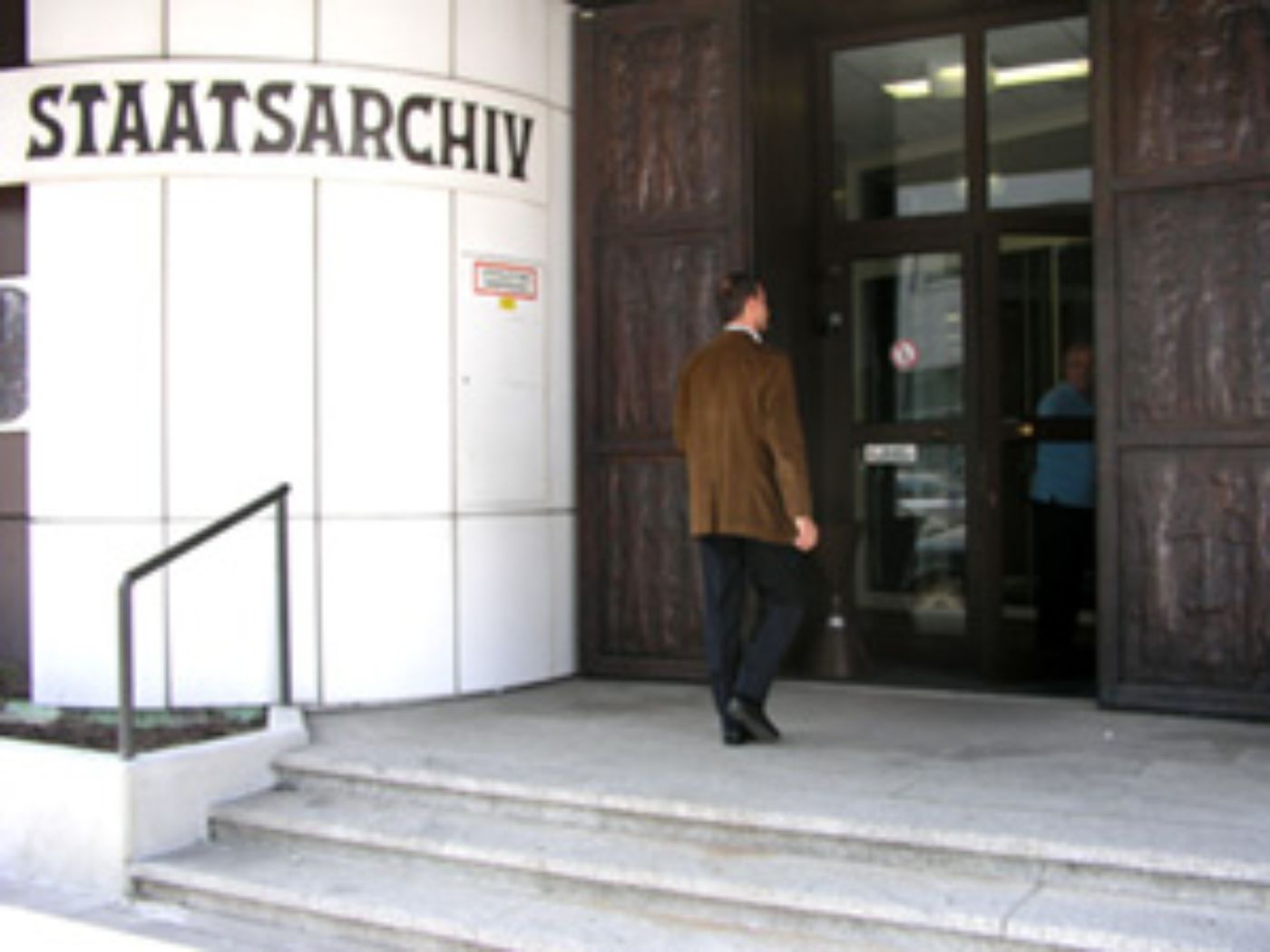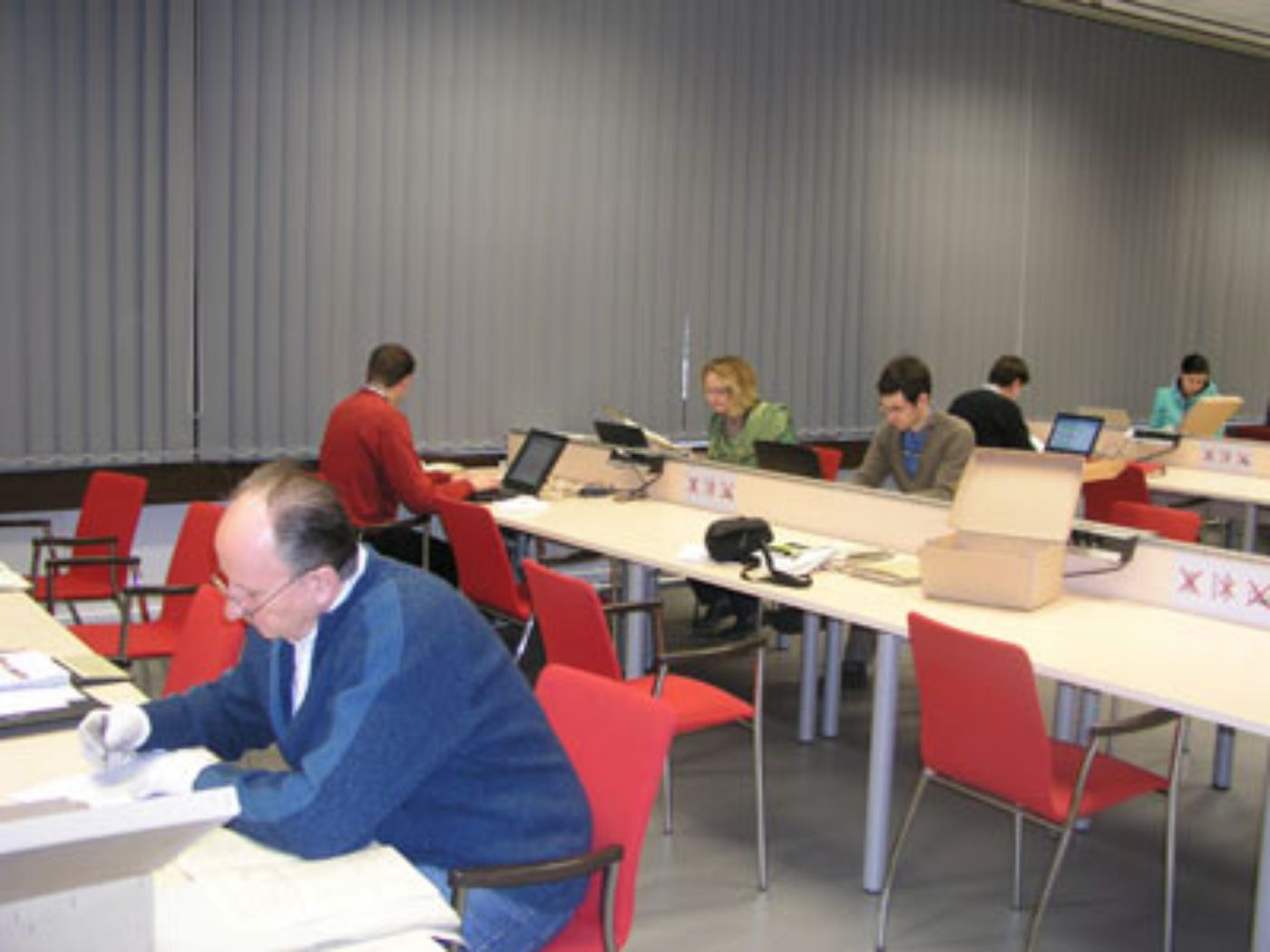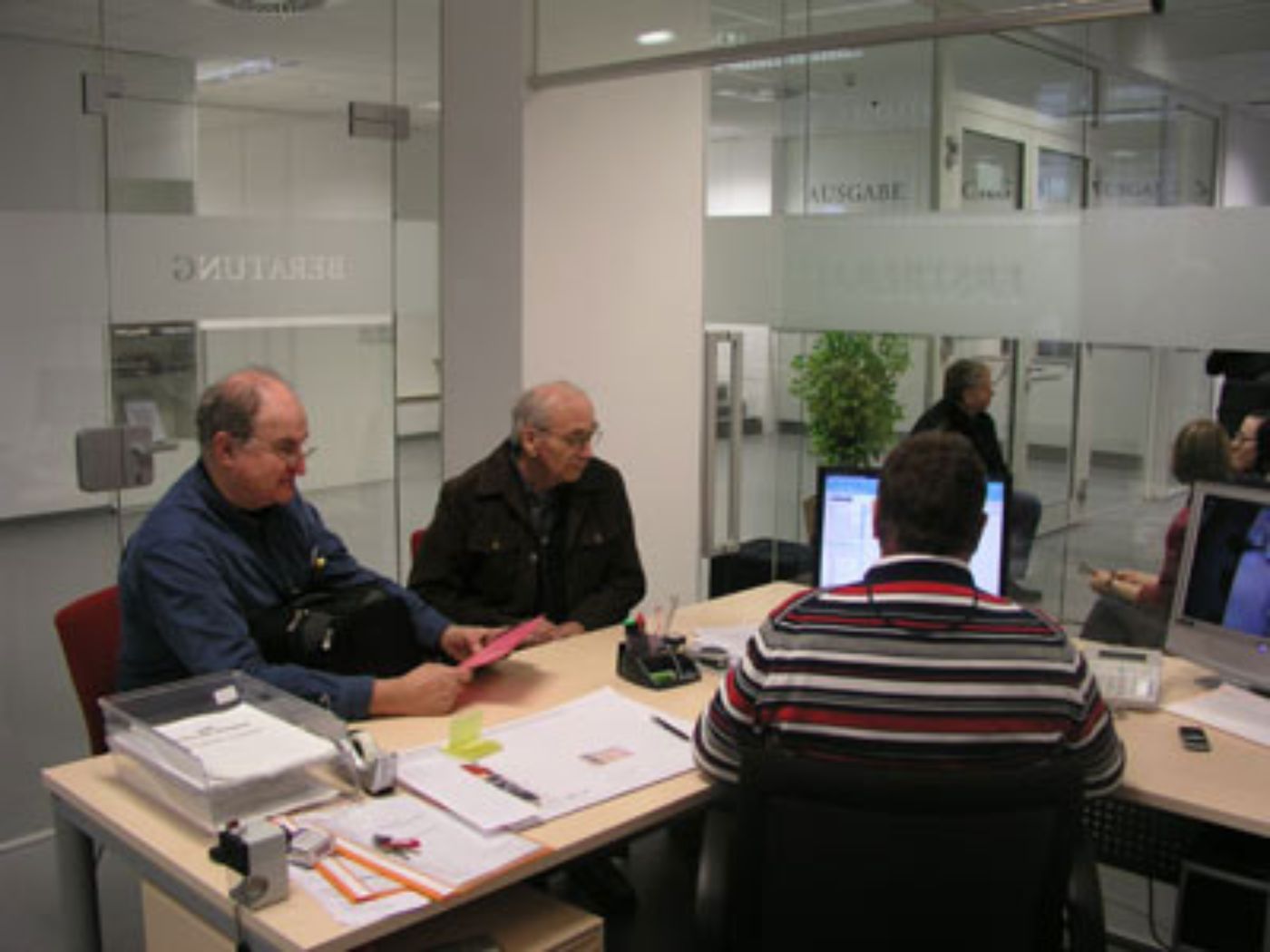How to use the archives
Preparing for the visit
Studying the relevant literature in-depth is the basis of successful work in archives. If based on archival materials, specialist literature will most likely contain precise references to the documents used, therefore also providing information about the relevant archives and their holdings. Ideally, you would also find correct reference numbers (which could be used to order said materials).

In today's digital age, preliminary information about the archive community in general and the holdings and collections of specific archives can conveniently be researched via the Internet; quality and density of the information available online is also increasing.
For more in-depth information you may also want to consult (older) printed guides to archives and inventories which are available in most major archives and record centres in Austria and abroad due to exchange of publication programmes, as well as in important (specialised) libraries.
The Austrian State Archives provide an online archive information system, the Archivinformationssystem, offering a broad range of options for preliminary research.
Preliminary contact with the archives
If you have established that documents relevant to your research interests are kept by the Austrian State Archives, please proceed by getting in touch with the relevant department in charge in due time (in any event no later than 14 days before you wish to visit), specifying your research request in as much detail as possible.

By doing so, there will be enough time to clarify matters in case of misunderstandings or ambiguities, and an unsuccessful visit to the archives can be avoided – or your visit can be rescheduled if necessary.
You can only pre-order archival materials to be ready on your first day of visiting the archive if you know of specific and valid archive signatures by contacting the relevant department in good time, either by telephone or in writing (e-mail). Please note that your specific orders must also be received in due time by the relevant department (no later than two days before your planned visit to the archive).
Otherwise, you will have to look up the necessary reference numbers on your own by consulting the archival finding aids or agency registers. The archive department in charge will be happy to give you advance information and advice on how to proceed. In general, it is in your own interest to wait for the archive department's reply before you travel.
Online tool for reservation
Please use our online tool www.oesta.gv.at/teres to reserve a seat in the respective reading room. Please note that this reservation and the ordering of archival materials from one of the archive departments are two different processes. If you want to consult private legacies, family archives or archives of nobility which have only been deposited with the Austrian State Archives but are not part of the archival holdings, please bear in mind that consultation may require the written approval of the owner. The archive department in charge will be happy to provide you with relevant information.
User request
To consult archival records and/or library materials at the Austrian State Archives, you must fill in a user request form ("Forscherbogen") once per calendar year in the reading room (stating personal details, topic of interest and purpose of use).

With your signature, you confirm that you are in agreement with the terms of use of the Austrian State Archives and that you will submit an unsolicited specimen copy to the library of the Austrian State Archives if you publish your research (monograph, essay, digital publication, university publication, etc.).
Please submit the completed user request form and a photo ID to the staff member on main duty in the reading room. The records you consult will subsequently be entered into the user request form by the service staff and struck off when you return them. Please make sure that all records have been struck off upon termination of your visit to the archive and advise the service staff of termination of your research if you do not plan on any further consultation during the current calendar year.

User card
Consultation of archival holdings and library stocks of the Austrian State Archives is subject to a charge (2-day pass 5 Euro; weekly or 5-day pass 10 Euro; monthly or 20-day pass 25 Euro; annual pass 50 Euro).
Before archival records or library material can be handed to you, you must have obtained a visitor pass (user card) from the cash desk of the Austrian State Archives.
Support staff will stamp the dates on which you visit the archives into the weekly and monthly passes (the contingent you paid for does not have to be consumed on consecutive days).
Preliminary advice
Two staff members of the Austrian State Archives per shift (morning and afternoon) will be in charge of supervising the reading room (main duty, support). The staff member on main duty is a higher-grade official who will take you through the initial administrative steps and give you general preliminary advice. He/she will direct you towards the finding aids available in the reading room and relevant for your research project. Overviews of finding aids are available for the archive departments "Allgemeines Verwaltungsarchiv", "Archiv der Republik" and "Kriegsarchiv".

The central reading room of the Austrian State Archives (Nottendorfer Gasse) is the reading room of four out of five archive departments of the Austrian State Archives; at the same time it is the room where books from the library can be obtained. In case of special queries, the official on duty will put you in touch with the subject specialist in charge of your research specialty.
The scientific archivist will usually be familiar with ongoing research in his/her special field and able to give guidance about the general situation concerning sources as well as existing literature. For details as to contents, it will normally be required to study the sources.
Support staff will hand you the archival records or books prepared for you and is in charge of photocopier maintenance.
Order process
If, with the help of finding aids, you have identified the reference numbers of records that can be ordered, please complete the order forms available in the reading room (name, date and valid reference number, i.e. group of holdings, holdings, series, number of volume, number of archives box etc.).

A separate order form has to be filled for each archival unit unless the units ordered are directly consecutive units.
The order forms are sorted according to departments, and according to groups of holdings within the department pigeonholes. The staff member on main duty will help you with addressing the order forms correctly.
Please note that orders are subject to restrictions: a maximum of three archives boxes or bundles, or 10 pieces (maps, plans, pictures etc.) may be ordered per day.
The material will be available in your user pigeonhole no later than two days after ordering. It will remain reserved for you for 4 weeks. If they are not used, the archival records or books will be returned automatically after this period.
Reading room rules
Desks in the reading room are used according to the first-come first-served principle. Large maps, plans and drawings may only be consulted on the desks specially designated for reading maps in the front section of the reading room. Special rules apply to certain archival records (e.g. the ennoblement acts in the "Allgemeines Verwaltungsarchiv").
Each desk is equipped with a socket for laptop computers.
It is not permitted to take bags, laptop covers, coats, umbrellas, food, beverages etc. to the reading room. Please keep these in the lockers in the cloakroom next to the reading room.
Making or taking phone calls in the reading room is not permitted. Please consider other users and switch your mobile phone off or keep it in silent mode while you are in the reading room.
You will not be allowed to use more than one archival unit at your desk. In your user request form, you commit yourself to handling the archival records and library material available to you carefully. The order within an archival unit must not be changed. Presumed defects or losses must be reported to the supervisor.
Unless you use a laptop, you may only use pencils for taking notes. If necessary, these can be provided to you by the Austrian State Archives.
After use, please hand the archival unit back to the return desk and ask it to be struck from your user request form if you do not need it any longer. If you want to continue consulting it, it will remain in your pigeonhole and continue to be reserved for you.
Reproductions
A2 overhead scanners and A3 color printers are available for use in the reading room. The required prepaid cards can be obtained at the cash desks of the Austrian State Archives.
As a matter of principle, self-service copying of the following materials is prohibited:
- archival records dating pre-1900
- bound archival records (registered, bound manuscripts, stapled files with narrow left margins)
- maps, plans and large-format written material
- photographs
- written material bearing seals
- index cards
- fire files of the Allgemeines Verwaltungsarchiv
- representations of coats of arms from the ennoblement acts in the Allgemeines Verwaltungsarchiv
- books from the library of the Austrian State Archives prohibited from copying
Moreover, the staff member on main duty may prohibit self-service copying for good cause, in particular for considerations of preservation.

Archival records and library material which is subject to the prohibition of self-service copying will be reproduced for you by the copying and photography office. The type of reproduction will depend on the nature and state of the original. Bound archival records will not be photocopied as a matter of principle.
A form (including a price list) is available for reproduction orders; please state the written material to be reproduced and the type of reproduction as well as any special requests when you complete the form. Moreover, please place identification strips.
The archival record to be reproduced must not be taken out of the container; even if only parts of a unit is to be reproduced; it must be handed to the support staff member on duty in the reading room with the reproduction order in its entirety. The reproductions will then be available at the cash desk of the Austrian State Archives or may be posted to you on request.
Illustrations showing archival records from the Austrian State Archives or extracts from these may only be published with the consent of the Archives against payment of the reproduction charge, and stating the source of the illustration.
Rules concerning reproductions of archival records from the Haus-, Hof- und Staatsarchiv may deviate from the above as microfilming and photography have been outsourced to private-sector companies.
Refreshments
Food, beverages, and smoking are not permitted in the reading room. You may consume any refreshments you have brought with you in the recreation area outside the reading room. Vending machines offering coffee and soft drinks are available there.